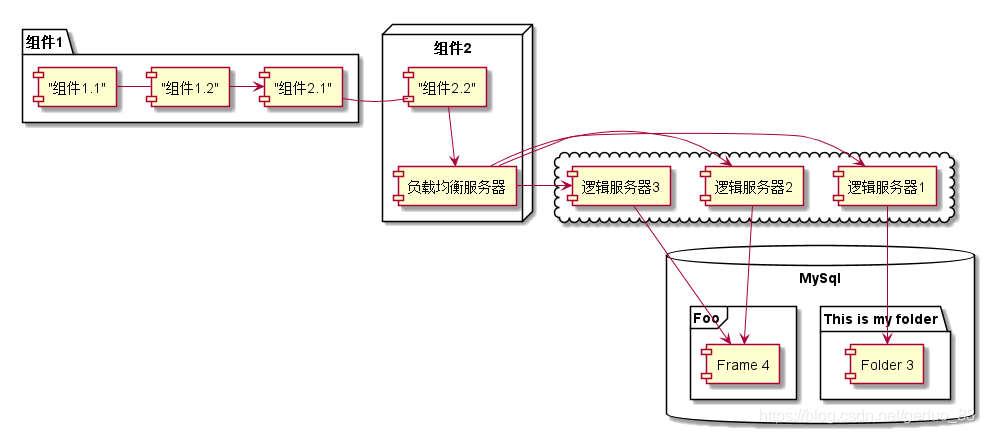程序员难免要经常画流程图,状态图,时序图等。以前经常用 visio
画,经常为矩形画多大,摆放在哪等问题费脑筋。
有时候修改文字后,为了较好的显示效果不得不再去修改图形。
今天介绍的工具是如何使用PlantUML 的插件画流程图,状态图,时序图等。这是一种程序员看了就会爱上的画图方式:自然,高效。
什么是 PlantUML
PlantUML 是一个画图脚本语言,用它可以快速地画出:
类图:http://plantuml.com/class-diagram
流程图:http://plantuml.com/activity-diagram-beta
时序图:http://plantuml.com/sequence-diagram
用例图:http://plantuml.com/use-case-diagram
状态图:http://plantuml.com/state-diagram
组件图:http://plantuml.com/component-diagram
1. 类图
案例1:
@startuml
abstract class AbstractList
abstract AbstractCollection
interface List
interface Collection
List <|-- AbstractList
Collection <|-- AbstractCollection
Collection <|- List
AbstractCollection <|- AbstractList
AbstractList <|-- ArrayList
class ArrayList {
Object[] elementData
size()
}
enum TimeUnit {
DAYS
HOURS
MINUTES
}
@enduml
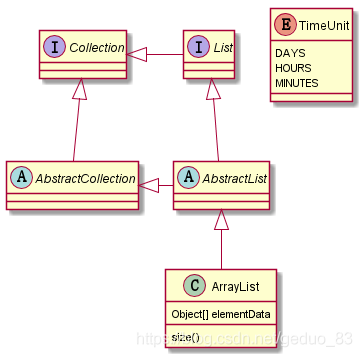
案例2:
@startuml
class Track
class Media
class Trip{
String tripID;
String tracks;
String medias;
}
Trip --> Track
Trip --> Media
interface ITripTrackCollection{
void start();
void stop();
void pause();
void destory();
}
class TripTrackCollection implements ITripTrackCollection{
Vector<LocationInfo> mLocations;
ExtcutorService mVecoterThread;
ScheduledExecutorService mDatabaseThread;
}
class TrackCollectService extends Service implements ITripTrackCollection{
TripTrackCollection TripTrackCollection;
}
TrackCollectService -->TripTrackCollection
@enduml
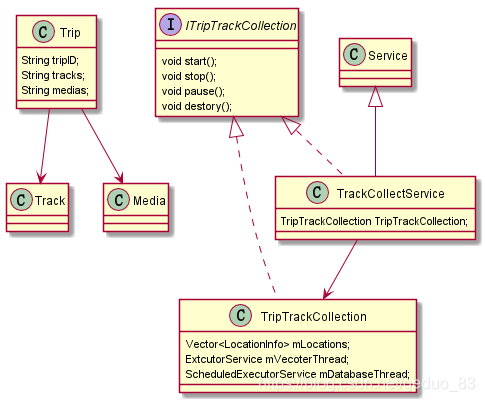
2. 流程图
案例1:
@startuml
(*) --> "check input"
If "input is verbose" then
--> [Yes] "turn on verbosity"
--> "run command"
else
--> "run command"
Endif
-->(*)
@enduml
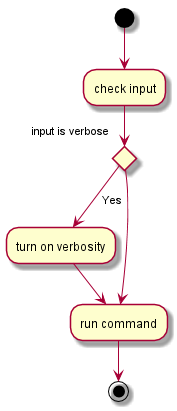
案例2:
start
:"步骤1处理";
:"步骤2处理";
if ("条件1判断") then (true)
:条件1成立时执行的动作;
if ("分支条件2判断") then (no)
:"条件2不成立时执行的动作";
else
if ("条件3判断") then (yes)
:"条件3成立时的动作";
else (no)
:"条件3不成立时的动作";
endif
endif
:"顺序步骤3处理";
endif
if ("条件4判断") then (yes)
:"条件4成立的动作";
else
if ("条件5判断") then (yes)
:"条件5成立时的动作";
else (no)
:"条件5不成立时的动作";
endif
endif
stop
@enduml
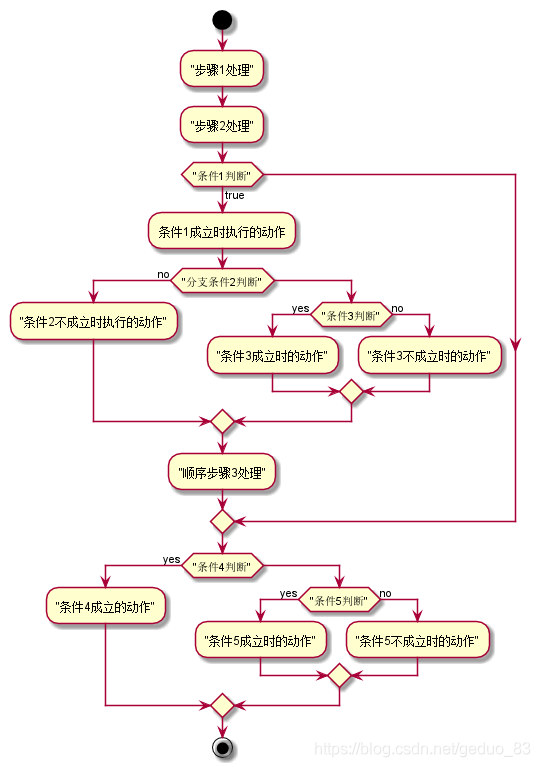
3.时序图
案例1:
@startuml
Alice -> Bob: Authentication Request
Bob --> Alice: Authentication Response
Alice -> Bob: Another authentication Request
Alice <-- Bob: another authentication Response
@enduml
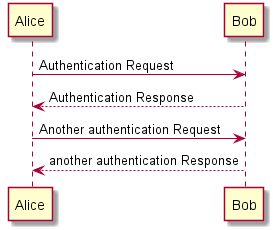
案例2:
@startuml
title Android Broadcast procedure
participant Activity #Lime
participant ContextWrapper #Cyan
participant ContextImpl #Cyan
participant ActivityManagerService #Cyan
participant ActivityStackSupervisor #Cyan
participant ActivityStack #Cyan
participant ApplicationThreadProxy #Silver
participant InnerReceiver #Magenta
participant ReceiverDispatcher #Magenta
participant BroadcastReceiver #Magenta
autonumber
Activity -> ContextWrapper : registerReceiver()
ContextWrapper -> ContextImpl : registerReceiver()
ContextImpl -> LoadedApk : getReceiverDispatcher()
LoadedApk -> ActivityManagerProxy : registerReceiver()
ActivityManagerProxy -> ActivityManagerService : registerReceiver()
Activity -> ContextWrapper : sendBroadcast()
ContextWrapper -> ContextImpl : sendBroadcast()
ContextImpl -> ActivityManagerService: broadcastIntent()
ActivityManagerService -> ActivityManagerService : broadcastIntentLocked()
ActivityManagerService -> ActivityManagerService : collectReceiverComponents()
ActivityManagerService -> ActivityManagerService : scheduleBroadcastsLocked()
ActivityManagerService -> ActivityManagerService : processNextBroadcast()
ActivityManagerService -> ActivityManagerService : deliverToRegisteredReceiverLocked()
ActivityManagerService -> ActivityManagerService : performReceiveLocked()
ActivityManagerService -> ApplicationThreadProxy : scheduleRegisteredReceiver()
ApplicationThreadProxy -> InnerReceiver : performReceive()
InnerReceiver -> ReceiverDispatcher : performReceive()
ReceiverDispatcher -> BroadcastReceiver : onReceive()
Activity -> ContextWrapper : sendOrderedBroadcast()
ContextWrapper -> ContextImpl : sendOrderedBroadcast()
ContextImpl -> ActivityManagerService: broadcastIntent()
@enduml

4. 用例图:
@startuml
:Main Admin: as Admin
(Use the application) as (Use)
User -> (Start)
User --> (Use)
Admin ---> (Use)
note right of Admin : This is an example.
note right of (Use)
A note can also
be on several lines
end note
note "This note is connected\nto several objects." as N2
(Start) .. N2
N2 .. (Use)
@enduml
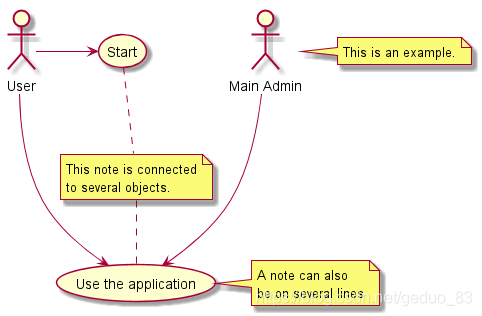
5. 状态图
@startuml
scale 350 width
[*] --> NotShooting
state NotShooting {
[*] --> Idle
Idle --> Configuring : EvConfig
Configuring --> Idle : EvConfig
}
state Configuring {
[*] --> NewValueSelection
NewValueSelection --> NewValuePreview : EvNewValue
NewValuePreview --> NewValueSelection : EvNewValueRejected
NewValuePreview --> NewValueSelection : EvNewValueSaved
state NewValuePreview {
State1 -> State2
}
}
@enduml
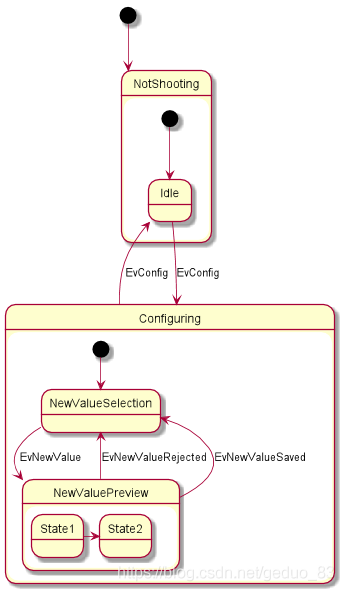
6. 组件图
案例1:
@startuml
package "Some Group" {
HTTP - [First Component]
[Another Component]
}
package "Other Groups" {
FTP - [Second Component]
[First Component] --> FTP
}
@enduml
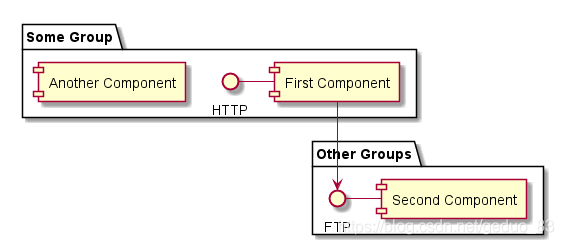
案例2:
@startuml
package "组件1" {
["组件1.1"] - ["组件1.2"]
["组件1.2"] -> ["组件2.1"]
}
node "组件2" {
["组件2.1"] - ["组件2.2"]
["组件2.2"] --> [负载均衡服务器]
}
cloud {
[负载均衡服务器] -> [逻辑服务器1]
[负载均衡服务器] -> [逻辑服务器2]
[负载均衡服务器] -> [逻辑服务器3]
}
database "MySql" {
folder "This is my folder" {
[Folder 3]
}
frame "Foo" {
[Frame 4]
}
}
[逻辑服务器1] --> [Folder 3]
[逻辑服务器2] --> [Frame 4]
[逻辑服务器3] --> [Frame 4]
@enduml
